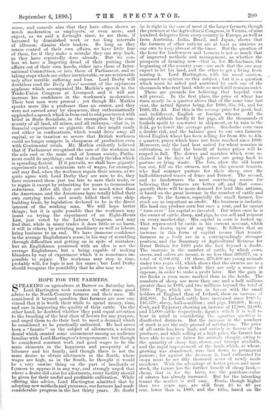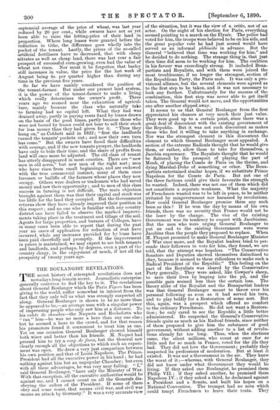HOPE FOR THE FARMERS.
SPEAKING on agriculture at Barrow on Saturday last, Lord Hartington took occasion to offer some good advice to the North-Country farmers and their men. He considered it beyond question that farmers are now con- vinced that it is worth their while to spend money, time, and care in improving the quality of their cattle. On the other hand, he doubted whether they paid equal attention to the breeding of the best class of horses for any purpose, and urged them to do their best to meet a demand which he considered to be practically unlimited. He had never been a "fanatic" on the subject of allotments, a solemn denial which created some amusement among an audience familiar with Lord Hartington's temperament ; but though he considered constant work and good wages to be the main elements in the happiness and prosperity of a labourer and his family, and though there is not the same desire to obtain allotments in the North, where wages are high, as in the South, he thought it would be a very unwise thing on the part of landlords or f amers to oppose it in any way, and strongly urged that where a desire did exist for allotments, every facility should be given for their useful and profitable cultivation. While offering this advice, Lord. Hartington admitted that by adopting new methods and processes, our farmers had made considerable progress in the last thirty years. No doubt he is right in the ease of most of the larger farmers, though the presence at the Agricultural Congress, in Vienna, of nine hundred delegates from every country in Europe, as well as from Australia, India, Brazil, and Japan, shows that the farmers of other nations are at least as anxious as our own to keep abreast of the times. But the question of the hour for landowners and farmers is not so much that of improved methods and management, as whether the prospects of farming now—that is, for Michaelmas, the beginning of the country year—are such that the one may expect to let his land, and the other to get a living from renting it. Lord. Hartington, with his usual caution, expressed no opinion on this subject ; but it is a question which must be asked and answered by each one of the thousands who rent land, while so much still remains unlet.
There are grounds for believing that hopeful view will prevail. Iu the first place, the price of wheat has risen nearly 5s. a quarter above that of the same time last year, the actual figures being, for 1890, 35s. 9d., and for 1889, 31s. 2d. But this is the average price for good, bad, and indifferent, English or foreign wheats. All the mouldy rubbish hardly fit for pigs, all the thousands of bushels spoilt by sea-water in shipment, or by rain in the field, go to lower the average price. Sea-borne corn runs a double risk, and the balance goes to our own farmers. Good English wheat has been selling for from 40s. to 43s. a quarter, prices which have not been reached since 1880. Moreover, only the laud best suited for wheat remains in cultivation, so that the benefit of better prices will be reaped in full. The downs and marshes which were re- claimed in the days of high prices are going back to pasture or lying waste. The loss, after the old leases ran out, fell on the owners, not on the present tenants, who find summer pasture for their sheep over the half-obliterated traces of fence and furrow. The second, and to landowners the most convincing reason for believing that farmers are better off, and that conse- quently there will be more demand for land this autumn, is based on the great increase in the number of cattle and sheep. To the farmer, especially the small farmer, live stock are as important as credit. His business is inelastic. His land can produce corn but once a year, and he cannot " turn over " his capital so invested. But when once lie is the owner of cattle, sheep, and pigs, he can sell and reinvest on every market-day. His capital in corn is locked up. That represented by cattle is his current account, which may be drawn upon at any time. It follows that an increase in this form of capital means that tenant- farmers as a body are in a correspondingly stronger position, and the Summary of Agricultural Returns for Great Britain for 1890 puts the fact beyond a doubt. The increase in the number of cattle, by which cows, steers, and calves are meant, is no less than 369,077, on a total of 6,508,632. Of these, 279,466 are young animals under two years old, which shows that the owners arc in a position to keep them while they are only a source of expense, in order to make a profit later. But the gain in the flocks is even more marked than in the herds. The numbers of sheep are more than one and a half millions greater than in 1889, and two millions beyond the total of 1888. Pigs, which are less in favour with the small holders of England than of Ireland, show an increase of 262,806. In Ireland, cattle have increased since 1889 Lc 146,579; sheep, half-a-million ; and pigs, 189,609; Kerry, Cork, and Tipperary showing an increase of 17,000, 22,000, and 15,000 cattle respectively, figures which it is well to bear in mind in considering the agrarian question in disaffected districts. But the increase in the numbers of stock is not the only ground of satisfaction. The price of all cattle has been high, and entirely in favour of the producer, and while selling at a high price, the farmer has been able to rear or fatten his animals cheaply, owing to the quantity of cheap hay, clover, and turnips available, and the rapid improvement of the lands which, as wheat- growing was abandoned, were laid down to permanent pasture ; for against the decrease in laud cultivated for crops must be set fifty thousand acres of newly made meadows. With the advantage of better prices and more stock, the farmer has the further benefit of cheap land, cheap, that is, for the hirer, for the purchase-value of estates has already increased. But for the intending tenant the market is still easy. Rents, though higher than two years ago, are still from 20 to 40 per cent. lower than in 1880, and the tithe, based on the septennial average of the price of wheat, was last year reduced by 20 per cent., while owners have not as yet been able to raise the letting-price of their land in proportion. Where long leases were granted before the reduction in tithe, the difference goes wholly into the pocket of the tenant. Lastly, the prices of the so-called artificial fertilisers have so decreased, that with cheap nitrates as well as cheap land, there was last year a fair prospect of successful corn-growing, even had the value of wheat not risen. Nor must it be forgotten that barley still increases in value, the price for the last week of August being 4s. per quarter higher than during any time in the previous five years. So far we have mainly considered the position of the tenant-farmer. But under our present land system, it is the power of the tenant-farmer to make a living which really determines the owner's profit. Three :years ago we seemed near the exhaustion of agricul- 'ture, mainly because the class who naturally take -to farming had no capital left. What they had was drained away, partly in paying rents fixed by leases drawn -on the basis of the good times, partly because those who were not bound by leases could not bear to sell their stock for less money than they had given for it. "Thus they hung on," as Cobbett said in 1822 ; " first the landlords turned the tenants' pockets out ; and now their own turn has come." But the owners have faced their difficulties with courage, and if the new tenants prosper, the landlords have only to bide their time, and the share of profits from land will once more be adjusted. The old class of tenant las utterly disappeared in most counties. There are " new men in old acres," but new men of the right sort ; men who have risen from small beginnings, and are endowed with the true commercial instinct, many of them once foremen or bailiffs of the farmers whose places they now occupy. Others were dealers or tradesmen who had saved -money and saw their opportunity ; and to men of this class success in farming is not difficult. The main objection brought against them was that their capital and stock was too little for the land they occupied. But the Government returns show they have already improved their position in this respect ; and no one who is familiar with any country district can have failed to observe the marked improve- ments taking place in the treatment and tillage of the soil. Agents for large properties, and bursars of Colleges, have in many cases been able to report that during the past year no cases of application for reduction of rent have occurred, while any increases provided for by lease have been paid cheerfully and promptly. If the improvement in prices is maintained, we may expect to see both tenants and landlords, and perhaps, by degrees, even a part of the country clergy, in the enjoyment of much, if not all the prosperity of twenty years ago.



































 Previous page
Previous page